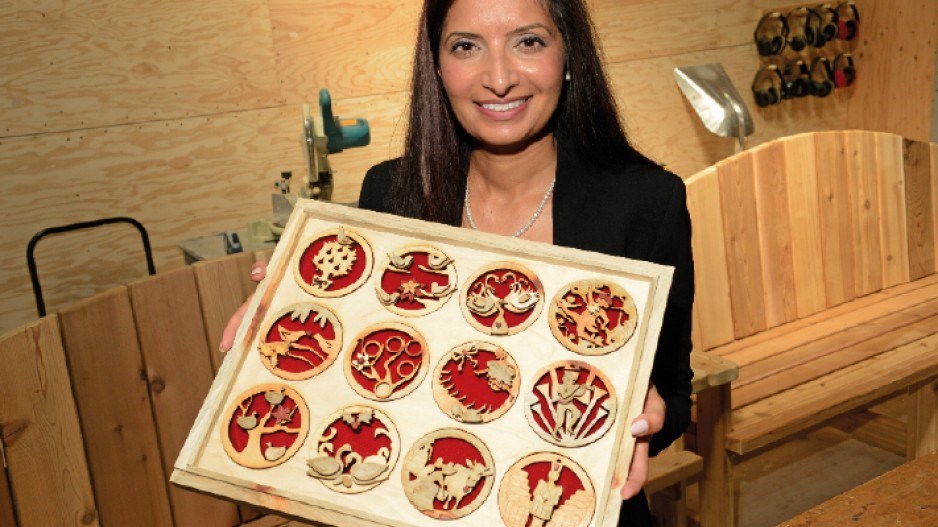Women in B.C. are more keen than men in this province to start a business within the next five years, according to a BMO survey conducted this spring.
"The entrepreneurial spirit is alive and well in B.C. and certainly in the women's market," said Joanne Gassman, senior vice-president of personal and commercial banking with BMO in Vancouver.
Maninder Dhaliwal didn't start out in business. But like many women entrepreneurs, she liked the flexibility and control that came with owning her own company.
"You can work really hard for 10 months, then travel for two months," said Dhaliwal, who started a lighting consultancy business in the mid-2000s.
That wasn't the case with her previous professional career as an electrical engineer.
"It was a seven-day-a-week job, and you didn't know you'd be working the weekend until Friday afternoon," she recalled.
Dhaliwal, 36, came to Canada from India in 1999 to attend UBC. She is now the executive director of Tradeworks Training Society. The organization operates two social enterprise businesses that train women and youth with barriers to employment in skills like carpentry.
She's passionate about helping women succeed in the careers that have been traditionally male-dominated.
"Culture is a huge barrier," she said. "It is still a boys' club in many ways. … The only way to change it is to have more women in trades and to have women leading teams in trades."
Eva Sun also has experience wading into the old boys' club. Sun, 58, followed her parents to Canada from Taiwan in 1976. She founded a rice import business, the Rice People, in 1983. At that time, the grocery business was primarily run by men.
The only real benefit to being a young Asian woman in the Lower Mainland food business in 1983?
"You have the advantage of people remembering you," said Sun.
The two burning questions most women entrepreneurs have when starting up a business are where will I find customers and how will I get financing, said Gassman.
Before they get to the bank, many women entrepreneurs have already found some financing, said Gassman.
That was the case with both Dhaliwal and Sun.
"I qualified for [a] Canadian Youth Business Foundation grant … And I got a line of credit through Vancity," said Dhaliwal.
Sun borrowed money from her father, who had run a series of grocery stores in the Lower Mainland.
"That's just part of Asian culture," said Sun. "When you see your children want to invest in something worthwhile, the parents always chip in. I didn't even bother to ask the bank."
The other vital advice Gassman has is to get a really good banker who can sit down with you and go through your business plan.
It's a lesson Sun learned the hard way.
"I had a big fall," said Sun. "I lost more than $6 million between 1987 to 1997."
A trusted accountant was able to show Sun that the business was worth saving, if she made some big changes.
"As a sole owner of the business, I focused on growing the revenue," she said. "I didn't pay enough attention to managing the business, which includes managing people."
Sun also paid for "good legal advice" to restructure the business.
Women have historically been more risk averse, which can lead them to hold back from growing or investing in their business.
But Gassman is seeing women increasingly willing to invest more, likely a result of currently low interest rates.
Sun said she has recently been focusing on investing in training dollars so her employees can help her grow the business.
Dhaliwal said that in her experience, sometimes women entrepreneurs like to stay small to keep their business manageable.
"When I ran a consulting business, I did not grow because I did not want the responsibility of having multiple people," she said.
Nevertheless, Dhaliwal believes that in general, women who own businesses should think bigger.
"Women should be more ambitious. They should take risks," she said. "Men talk about building a $1 billion business. Women don't talk about that."
Do women immigrants make good entrepreneurs?
The answer is a resounding yes, say Maninder Dhaliwal and Eva Sun.
"If you've left everything you knew behind and you've moved to a different country, you're already a risk taker," said Dhaliwal.
"Immigrants already take a big jump in their life to go to a new country," agreed Sun.
Dhaliwal said that women with professional degrees from their home countries may face an uphill battle to be able to practise in Canada. Starting a business can be a faster way to get ahead.




